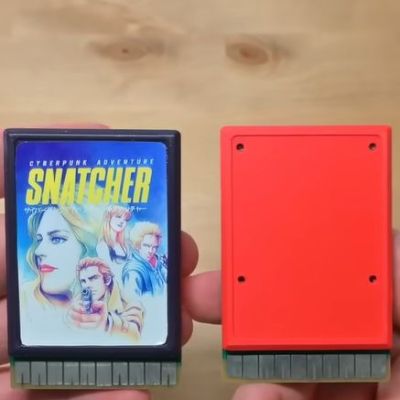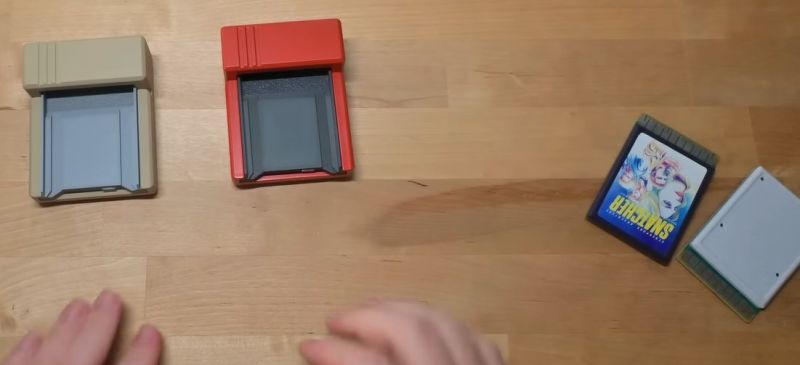As practical SD cards are, they lack much of what made floppy disks and cartridges so awesome: room for art and a list of contents, as well as the ability to not be lost in shaggy carpet or down a pet’s gullet. In a fit of righteous nostalgia, [Abe] decided that he’d turn SD cards into cartridges in the best way possible, and amazingly managed to not only finish the project after two years, but also make it look snazzy enough to have come straight out of the 1980s. The resulting cartridges come both with fixed (256 MB) and removable micro SD card storage, which are mounted on a PCB that passively connects to pogo pins in the custom, 3D printed reader.

The inspiration for this project kicked in while [Abe] was working on a floppy drive conversion project called the Floppy8, which crammed an MCU into an external floppy drive along with a rough version of these SD card-based cartridges that used the physical card’s edge connector to connect with a micro SD slot inside the converted floppy drive. The problem with this setup was that alignment was terrible, and micro SD cards would break, along with a range of other quality of life issues.
Next, the SD card was put into a slot on the carrier PCB that featured its own edge connector. This improved matters, but the overly complicated (moving) read head in the reader turned out to be very unreliable, in addition to FDM printed parts having general tolerance and durability issues. Eventually a simplified design which takes these limitations in mind was created that so far seems to work just fine.
Although SD cards in cartridges are not a new idea, using them purely as a data carrier is far less common. One could argue about the practicality of turning a fingernail-sized micro SD card into something much larger, but in terms of aesthetics and handleability it definitely gets an A+.
















I’d say this was pointless if I hadn’t been actively considering a similar idea
from the scratch marks on the cartridge contacts i’m pretty sure the reader uses point contacts
I think a lot of people forget that if your building something for the public to use it needs to be durable and practically indestructible. SD cards are fine for individuals because if they break them, the user is out money and there is a vested interest in the user not misusing them. If it’s somebody else’s property people will damage even the most fool proof things. If it’s not their property many people don’t care. Looking at ways to redesign things to make them less likely to fail is a good thing even if the public won’t be using them.
There’s a small typo in the caption of the image on the right. I expect that “adn” should become “and”.
Fixed, thank you.
I wholeheartedly approve. SD cards are just too small, never mind microSD. Because you can’t write a meaningful label on them, so it’s hard to tell them apart without putting one in a device that can read it. Which, if you aren’t sure where it came from, is a bit of a risk.
it’s surprisingly difficult to make ‘removable memory cartridges’ nowadays (well, maybe all the days?) Especially thin ones, for relativley thin profile things.
This is an area which has fascinated me for some time and this hack has given me a little inspiration to spin a project that i’ve been playing around with!
I don’t know, the PS Vita has insanely thin game cards with a similar surface area to the Switch’s
Don’t forget ‘credit cards’
Or more relevant, old SGS / master system games , some came on credit card like things.
And the Atari Lynx.
I meant thin DIY games carts
Or you could just use CompactFlash
Love it. I’d love to do this with my PC libraries, and give each one some nice art on a sticker. Maybe have different color plastics for Steam, GOG, Epic, Plex, My Photos ect…